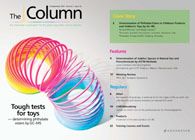Bug drugs
A study into the way that the tropical parasite Leishmania uses the nutrients they need to grow has provided researchers with drug targets that could be used to combat them.
A study into the way that the tropical parasite Leishmania uses the nutrients they need to grow has provided researchers with drug targets that could be used to combat them.
Leishmania are tropical parasites that proliferate in sandflies and are transferred to mammals when they are bitten by the fly. They infect 12 million people worldwide, causing a range of reactions, from skin conditions to organ infection, and are responsible for 500 000 deaths annually.
A study, published in the Journal of Biological Chemistry,1 has developed an analytical method that has revealed the metabolic pathways essential for the parasite’s survival, down to the particular atoms it uses as a food source. To study the metabolism 13C-labelled carbon sources were introduced into the sugar glucose that the parasites feed on. Gas chromatography–mass spectrometry and nuclear magnetic resonance were then used to follow how the atoms were incorporated by the parasite, revealing the metabolic pathways essential to the parasite’s survival, which would, therefore, be good drug targets to block to kill it.
According to the authors, current anti-parasitic drugs have enormous side effects, as they don’t target specific pathogen metabolic pathways. With a greater understanding of the parasite, specific drugs can be developed with minimal side effects.
1. E.C. Saunders et al., J. Biol. Chem.,286, 27706–27717 (2011).
This story originally appeared in The Column. Click here to view that issue.
Measuring Vitamin K1 Concentrations in Dogs with Chronic Enteropathy Using LC–MS/MS
May 14th 2025A joint study between the University of Tennessee (Knoxville, Tennessee) and the University of Pennsylvania School of Veterinary Medicine (Philadelphia, Pennsylvania) compared directly measured vitamin K1 (vitK1) concentrations in healthy dogs and dogs with chronic enteropathy (CE) using liquid chromatography tandem mass spectrometry (LC–MS/MS); they also investigated whether supplementation of vitK1 in dogs with CE would significantly increase vitK1 concentrations.
HPLC 2025 Preview: Fundamentally Speaking (Part 2)
May 14th 2025Michael Lämmerhofer from the Institute of Pharmaceutical Sciences, University of Tübingen, Germany, spoke to JFK Huber Lecture Award winner of 2024 Torgny Fornstedt, professor in analytical chemistry and leader of the Fundamental Separation Science Group, Karlstad University, Sweden, about his pioneering work in high performance liquid chromatography (HPLC) with a focus on fundamentals, ion-pair chromatography, and oligonucleotide applications.

.png&w=3840&q=75)

.png&w=3840&q=75)



.png&w=3840&q=75)



.png&w=3840&q=75)










